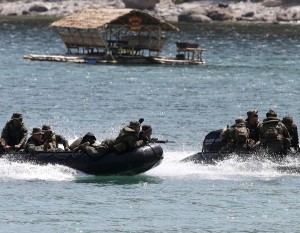Palace hardens stand on increased US troops’ presence
MANILA, Philippines – Amid fears of a clash between the Executive and the Legislative branches of government, Malacañang reiterated its position that the increased military rotational presence agreement with the United States will not require Senate ratification.
“It is an agreement that builds upon and or implements the provisions of the Mutual Defense Treaty as well as Visiting Forces Agreement (VFA)…These are mainly provisions which implement both treaties which have already been previously ratified by the Senate,” Presidential spokesperson Edwin Lacierda said in a televised press briefing.
He admitted that the Executive and the Legislature may have different interpretations.
But he said, “I think let us wait for the final agreement to be completed and then… I am certain, like what we did with the Bangsamoro annexes, is to inform the Senate and the legislature.”
Between the Senate and the House of Representatives, it is the Senate that has the power to ratify treaties entered into by the Executive.
Article continues after this advertisementLacierda insisted that the Philippines will only provide the US forces with “access.”
Article continues after this advertisement“We are very cognizant of the limitations imposed by the Constitution and other applicable laws. So the Philippine panel works around those parameters, and so there should be no issue as to permanent basing,” he said.
However, geopolitics expert and University of the Philippines professor Roland Simbulan said the Executive should at least consult the Senate’s 10-year review of the VFA in 2009.
“At that time President (Benigno) Aquino was still a senator. That review by the Philippine Senate became a basis of a Senate resolution to seek a bilateral review of the VFA,” he said in a phone interview with INQUIRER.net last week.
Simbulan said a thorough and independent review of the VFA should be done as opposed to the one being conducted by Executive Secretary Paquito Ochoa.
“But that review that they are doing, it’s under the executive branch. I don’t think it will be objective. That review will only justify what they want,” he said.
The professor explained that while the rotational presence agreement will only expand what the two countries already have under the VFA, a review on US military presence is crucial.
“Because why would you increase something that is really not helping us and is disadvantageous to our interests?” he explained.
Simbulan pointed out that Aquino was among the signatories of the Senate resolution asking for a bilateral review amid reports of US troops abusing or even violating the provisions of the VFA.
“It’s a good basis (for the new agreement). It’s not as if we’re starting from scratch,” he said.
The US aims to “pivot” or rebalance its forces towards the Asia Pacific amid the increasing economic and military power of China. It coincides with the intensified territorial disputes of the Philippines and other countries with the China, which has led to increased tension in the region.
RELATED STORIES
Talks for US troops’ presence in PH still ongoing
Issues raised over US troops’ return to PH
